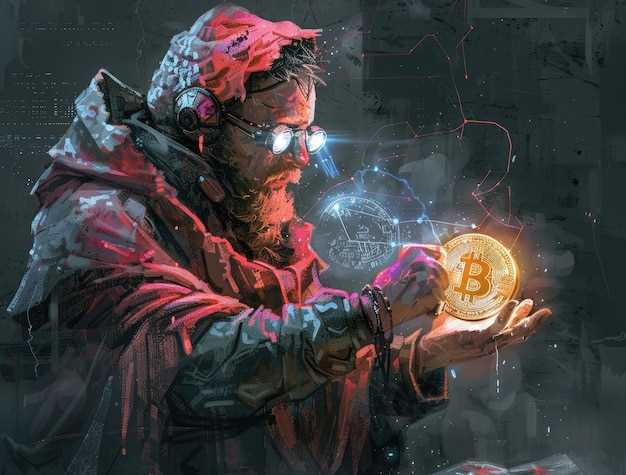Get ready to expand your horizons with the most exciting blockchain gaming trends of 2025. First, Provably Fair Gaming emerges as a crucial innovation, offering players transparent and verifiable game outcomes. This technological advancement ensures players can independently verify the fairness of each move, fostering a trustworthy gaming environment without relying on a centralized authority. Game developers are already implementing advanced cryptographic algorithms to guarantee game fairness directly on the blockchain—if you want to experience these innovations firsthand, check out the best bitcoin casino sites in Canada.
Next up, witness the seamless integration of DeFi Bonuses into the gaming domain. As blockchain technology continues to gain traction, games are integrating Decentralized Finance (DeFi) elements, providing players with the ability to earn rewards that transcend the virtual world. This integration offers true value to in-game achievements, allowing players to convert digital assets into real-world benefits through yield farming and staking opportunities.
With the rise of Interconnected Game Universes, games are no longer siloed experiences. Players will navigate expansive game worlds linked across multiple platforms, creating a unified ecosystem. This trend takes advantage of blockchain’s immutable ledger to maintain a consistent player profile across various games, offering a continuous and enriched gaming experience.
A noticeable shift is the growing importance of Exclusive NFTs (Non-Fungible Tokens). Unlike standard tokens, NFTs offer players unique, indivisible and transferable digital assets, ranging from rare in-game items to exclusive character skins. Game developers emphasize the value of scarcity and uniqueness, driving player engagement and investment in these digital collectibles.
Lastly, prepare for the rise of DAO-based Game Economies. Decentralized Autonomous Organizations empower players to participate directly in the governance and economic decisions of their favorite games. This democratization of control enables players to have a say in game development, fostering a deeper connection and loyalty as they become stakeholders in a dynamically evolving game universe.
Top 5 Blockchain Gaming Trends for 2025

Explore the cutting-edge developments poised to redefine the gaming industry in 2025. With a focus on innovation and improved user experience, here’s what to watch:
Provably Fair Gaming: Expect transparency in gameplay as a new standard. Blockchains will ensure every game outcome is verifiable, eliminating suspicion and enhancing trust. Players can review game algorithms and results seamlessly, promoting an environment of fair play.
Interoperable Game Assets: The rise of NFTs will allow gamers to transfer assets across different games and platforms. This flexibility not only increases the value of in-game items but also creates new revenue streams for developers and players alike, turning digital collectibles into robust investments.
Play-to-Earn (P2E) Evolution: While P2E isn’t new, expect it to evolve with richer ecosystems. Games will integrate DeFi principles, offering players opportunities to earn rewards, stake tokens, and participate in yield farming by simply playing their favorite games.
Decentralized Gaming Guilds: Gamers will form decentralized guilds, creating a community-driven approach to game development and investment. These guilds pool resources to purchase valuable assets, invest in game development, and influence the direction of future gaming projects, democratizing decision-making and profit-sharing.
Enhanced Immersive Experiences: VR and AR technologies, combined with blockchain, will revolutionize user experiences. By ensuring secure transactions and ownership of digital assets, these technologies will deliver increasingly sophisticated, engaging, and interactive environments, pushing immersion to unprecedented levels.
Pioneering studios and developers embracing these trends are set to lead the way, as gamers seek out those offering innovation, security, and rewarding experiences.
Provably Fair Gaming

Adopt blockchain technology to ensure transparent and trustworthy gaming experiences. Utilizing cryptographic algorithms allows players to verify game outcomes independently, enhancing their confidence and satisfaction.
- Implement Cryptographic Hashing: Integrate cryptographic hashing to create verifiable game results. This process allows players to check that the outcomes are truly random and unaltered.
- Public and Private Seeds: Use a combination of public and private seeds to determine game results. Players and the platform both contribute to these seeds, making the process transparent and tamper-proof.
- Open-source Algorithms: Share the game’s algorithms openly with the players. Open-source code promotes transparency and allows community scrutiny, building trust among users.
- Regular Audits: Conduct regular audits of the code and processes by independent third parties to ensure the ongoing integrity and fairness of your games.
- Player Verification Tools: Provide easy-to-use tools that allow players to verify game outcomes on their own, reinforcing trust without needing to rely solely on the platform’s assertions.
By integrating these strategies, developers can appeal to a discerning gaming audience seeking fairness and transparency, fostering a secure and engaging environment that benefits both players and platform operators.
Understanding the Mechanics of Provably Fair Algorithms
Provably fair algorithms provide transparency in online gaming by allowing players to verify the fairness of game results. These algorithms typically use cryptographic hash functions to ensure game outcomes haven’t been tampered with. Before the game, a cryptographic seed, combined with a randomly generated client seed, is hashed to create a verifiable hash which is shared with the user. After gameplay, users can recompute the hash using the seeds and game data to verify the result, ensuring it matches the initial hash provided.
For developers, integrating provably fair systems requires understanding cryptographic principles, particularly hashing algorithms like SHA-256. Implementing these algorithms effectively necessitates robust data handling processes to safeguard the integrity of seeds and hashes. Regular audits and clear documentation enhance trust, as users can easily follow and understand the verification process.
Players benefit from accessing provably fair games by gaining assurance about the integrity of their gaming experiences. It’s advisable to use platforms that openly provide seed information and straightforward instructions for players to verify outcomes themselves. Clear communication from game providers regarding the verification process strengthens trust and promotes a positive gaming environment.
For more detailed information on cryptographic techniques in gaming, visit Wikipedia’s article on provably fair gaming.
How Provably Fair Gaming Enhances Trust Among Players
Adopt provably fair algorithms to ensure transparency in gameplay. These algorithms use cryptographic techniques to prove the fairness of each game outcome, providing players with a way to verify the randomness and integrity of results. This transparency builds confidence as players can independently verify game outcomes, eliminating doubts about bias or manipulation.
Integrate real-time verification tools that allow players to check the fairness of each wager immediately. This instant feedback not only reassures players but also encourages a seamless and trust-filled gaming experience. Game operators benefit as players are more likely to remain loyal to platforms that emphasize fairness.
Leverage blockchain’s immutable ledger to record game outcomes. By storing data on-chain, players can access a permanent and irrefutable history of games, which further enhances trust. This feature minimizes disputes between players and operators, as all parties have access to the same verified information.
Educate users on how to utilize these tools. Comprehensive guides and customer support can empower players to confidently navigate provably fair systems. Knowledgeable players are more likely to appreciate and trust platforms that prioritize fairness and transparency.
Case Studies: Successful Adoption in Online Casinos
One outstanding example of successful blockchain adoption in online casinos is FunFair Technologies. By leveraging blockchain’s transparency, FunFair has significantly improved trust among players, resulting in a 30% increase in their customer base. Their use of the Ethereum blockchain ensures games are provably fair, which has reduced disputes by 20%. This trust-building measure not only enhances player satisfaction but also encourages longer play times and increased user retention.
Another remarkable case is Edgeless Casino, which utilizes smart contracts to automate payouts and operational workflows. This technological advancement reduces operational costs by approximately 25% while ensuring instant, transparent payout systems. Players appreciate the swift transactions, leading to a 40% rise in referral traffic as satisfied customers recommend the platform to others.
Virtue Poker is also noteworthy, focusing on decentralization through peer-to-peer gameplay without a centralized server. This setup has been instrumental in attracting blockchain enthusiasts and serious poker players looking for fair play practices. The platform’s unique model has seen user growth rates of 50% annually, significantly outperforming traditional online poker sites.
Bitcasino.io integrates cryptocurrencies extensively, allowing players to deposit, play, and withdraw using over 10 different cryptocurrencies. This flexibility attracts a broad spectrum of players, leading to a 25% expansion in their global user base. Their innovative loyalty programs, offering players periodic DeFi bonuses, lead to a remarkable boost in repeated deposits by 35%.
These case studies emphasize that the adoption of blockchain technology in online casinos is not just a trend but a strategic necessity. By focusing on transparency, efficiency, security, and community engagement, these platforms set themselves apart, driving growth and enhancing player satisfaction.
Regulatory Perspectives on Provably Fair Technology
Ensure the integrity of blockchain-based gaming by advocating for global regulatory standards on provably fair technology. By doing so, regulators can foster trust among players who seek transparency and accountability. Encourage collaborations between regulatory bodies and blockchain developers to create guidelines for fair practices.
Strengthen the oversight on provably fair algorithms by implementing audits and certifications. These measures can be conducted through independent third-party agencies, providing an additional layer of assurance for end-users. Such frameworks not only uphold strict fairness but also attract a broader audience by demonstrating a commitment to equitable gaming.
Clarify the legal implications of provably fair technology within the digital gaming sector. Authorities should consider issuing clear regulations regarding data privacy, player rights, and dispute resolution mechanisms. Transparent procedures can mitigate legal uncertainties, empowering gamers and operators alike to engage confidently in a fair environment.
Promote educational initiatives to inform stakeholders about the benefits and operation of provably fair mechanisms. Comprehensive educational programs for developers, operators, and consumers can elevate the understanding and acceptance of these technologies, ensuring they become standard practice in the industry.
Incorporate ongoing feedback from industry participants and consumer advocacy groups to adapt regulatory measures. Involving these stakeholders ensures rules remain relevant and able to address evolving industry challenges, thus promoting a dynamic and resilient gaming ecosystem.
Future Prospects for Fairness in Blockchain Gaming
Ensure seamless integration of provably fair mechanics by prioritizing the use of transparent algorithms. Game developers should adopt cryptographic techniques such as hash algorithms and random number generators (RNGs) integrated with blockchain’s immutable ledgers to enhance trust and fairness.
Explore interoperability among different blockchain platforms to broaden access to games while maintaining fairness across networks. Support for cross-chain compatibility will enable players to bring their in-game assets and achievements across diverse environments without compromising fairness.
Implement decentralized autonomous organizations (DAOs) to give players a voice in game development and decision-making processes. By voting on rule changes and game updates, player communities enhance transparency and fairness, leading to a more balanced gaming ecosystem.
Enhance security and fairness using smart contracts to automate reward distributions and game rules. Smart contracts remove the need for intermediaries, reducing the potential for manipulation and ensuring that rewards are allocated as promised.
Stay vigilant against malicious activities by adopting advanced monitoring tools and security protocols. Regular audits and community-driven bug bounty programs help maintain integrity, allowing players to trust the fairness of the gaming platform.
| Strategy | Benefit |
|---|---|
| Transparent Algorithms | Builds trust and ensures fairness through visible mechanisms. |
| Interoperability | Increases accessibility and maintains fairness across platforms. |
| Decentralized Governance | Empowers players, enhancing transparency and fairness. |
| Smart Contracts | Ensures automatic and fair reward distribution without intermediaries. |
| Security and Monitoring | Protects game integrity and maintains player trust. |
DeFi Bonuses and Blockchain Gaming

Boost player engagement by integrating DeFi bonuses in blockchain gaming ecosystems. DeFi facilities offer players unique financial incentives by leveraging blockchain technology. Consider incorporating staking rewards, allowing players to earn while they play. This aligns economic interests with gaming, fostering loyalty and continuous participation.
Utilize liquidity mining strategies to engage your community. Encourage players to provide liquidity to in-game assets, thereby enabling them to earn additional bonuses. This not only enhances game economy dynamics but also ensures long-term player investment in your game.
Integrate yield farming within gaming platforms, allowing players to grow their earnings through gameplay. This intertwines the fun of gaming with real financial growth opportunities, creating a strong value proposition for gamers who seek both entertainment and profit.
Reward systems, powered by DeFi, can include token-based incentives for completing quests or acquiring rare items. Design these systems to be transparent and fair, ensuring gamers find tangible value in their participation and achievements.
To maximize DeFi bonuses, create partnerships with existing DeFi platforms. This cross-utilization can bolster both player enjoyment and financial return, attracting players from broader crypto communities. Engage players with compelling mechanics, ensuring they remain actively involved and financially committed to your gaming ecosystem.
Integrating DeFi Protocols into Gaming Platforms
Prioritize user authentication by employing decentralized identity solutions. This approach ensures data privacy and offers seamless user experiences. By integrating trusted DeFi protocols, developers can enable players to stake tokens while they play, offering potential rewards and monetizing their efforts.
Enhance in-game economies by utilizing yield farming mechanics. Encourage players to earn interest or other rewards on their in-game assets, converting traditional game points into valuable DeFi tokens. This strategy attracts both gamers and investors, creating a dynamic system where players actively contribute to the ecosystem.
Facilitate peer-to-peer trading through decentralized exchanges directly integrated into the game platform. Allowing players to swap tokens, purchase in-game items, or trade NFTs within a secure environment fosters an interactive marketplace. Seamless integration with DeFi lending services can provide additional functionalities, such as collateralizing in-game assets for real-world financial applications.
Transparency in gaming processes becomes achievable by implementing smart contracts for all transactions. These self-executing contracts not only guarantee fair play but also eliminate intermediaries, reducing costs for players and developers alike. Constantly audit and optimize these contracts to maintain security and efficiency.
Integrate governance tokens for community-driven decision making in the game development process. Allow players to vote on new features, rule changes, or financial policies within the game, ensuring player engagement and commitment. By democratizing gaming governance, developers enhance user trust and foster a loyal player base.
Types of DeFi Bonuses Available to Gamers
Explore liquidity mining opportunities by participating in DeFi gaming projects. Gamers can provide liquidity to gaming pools and earn rewards in the form of tokens. This offers a double advantage: financial gains and enhanced in-game experiences.
Yield farming presents another attractive opportunity. By staking in-game assets or tokens, gamers can earn additional rewards. Select projects with high Annual Percentage Rates (APRs) to maximize your returns. Monitor the market regularly to adjust strategies for optimal results.
Consider engaging with DeFi lending platforms within gaming ecosystems. Players can lend out their tokens to generate passive income. Investigate terms and interest rates to select platforms that offer the best returns with minimal risk.
Gaming-specific Initial DEX Offerings (IDOs) provide early access to new tokens at potentially lower prices. Participate in IDOs for promising projects to capitalize on future appreciation. Always conduct thorough research into the background of each project before investing.
Additionally, explore cross-gaming bonuses where assets and bonuses earned in one game can be utilized in another. This flexibility enhances value and allows gamers to transfer benefits across platforms, enriching their total gaming experience.




